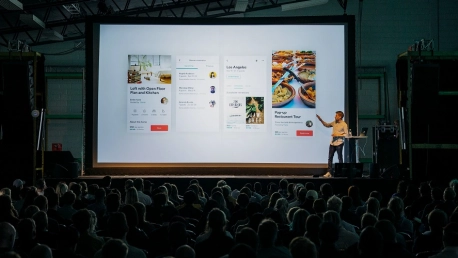The COVID-19 pandemic has not only changed the way people live, work and spend their free time, it has also changed the way they interact with their favorite brands. During the last two and a half years, people around the world have been forced to experience life with almost no concerts, social gatherings and parties. Just like the people, many brands have also been forced to cancel their own events, or to transform them into remote or hybrid experiences. As partnering with other brands and companies to create an amazing in-person event became a thing of the past, marketers were left wondering when life, and marketing, will return to normal.
Come 2022, however, in-person events are not only possible, but unavoidable, as the global pandemic seems to have run its course. Companies and brands in the US and abroad can finally return to providing their customers with in-person experiences like concerts and parties, while marketers can return to planning their next product launch event. However, with virtual event platforms still available and online events usually more affordable than in-person events, some have started to wonder if they should return to traditional events at all. After all, what better way is there to celebrate the digital age than by hosting memorable online events?
Making the Right Choice
Although virtual event platforms were available even before the global healthcare crisis, there is no question that the pandemic has accelerated the adoption of many new technologies and apps, making online events much easier to host. These new technologies have proved to be even more flexible than traditional gatherings, allowing people that are miles apart to attend the same meetings. Moreover, they also come with the advantage of attracting attendees at a lower cost than in-person events—a significant selling point for marketers everywhere.
However, there are also important disadvantages to virtual and hybrid events—disadvantages that could make in-person events irreplaceable for many years to come. Meeting new people, like clients and potential partners, is an important part of traditional events. By simply talking to journalists, influencers and bloggers, marketers can transform a meeting into an enormous opportunity and breakthrough for their brand or product. This is much harder to do online, as virtual events lack the personal touch of in-person gatherings.
Fighting Digital Burnout
Another important advantage of in-person events is the fact that they come with little or no risk of aggravating digital burnout—a problem that has become more prevalent during the COVID-19 pandemic. According to a study by global online employment platform Monster, 69% of the American employees questioned for the survey in early and mid-2020 were already experiencing burnout symptoms while working remotely. As time passed, more people started to show symptoms of anxiety, exhaustion, and apathy—caused by spending too much time on digital devices.
Digital burnout is an important issue to consider before choosing to host either an online or in-person event. While hosting a virtual event comes with much lower costs and numerous technological advantages, it can also lead to digital fatigue—especially if the attendees are already struggling with digital burnout, or if they are spending multiple hours online. In-person events are ideal for creating a connection with people, and they are also extremely useful in assessing the market and reactions.
Returning to In-Person Events
Remote and hybrid experiences are here to stay, and marketers in the US and abroad will continue to host online events in the future. With new technologies and applications developing by the day, more people will adopt virtual event platforms like Hoppier and SpatialChat, and use them to create bespoke virtual events that increase attendee engagement. However, in-person events come with other advantages like the possibility of meeting new people and discovering brands, products or services hands-on without worrying about digital fatigue. For now, online, hybrid and in-person events should all be part of every marketer’s plan, and choosing between them should be assessed case by case and goal by goal.









